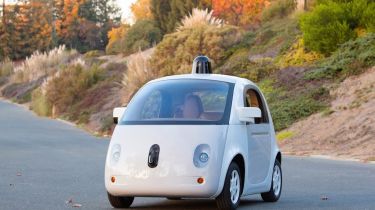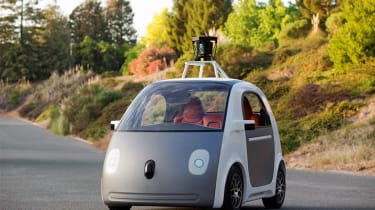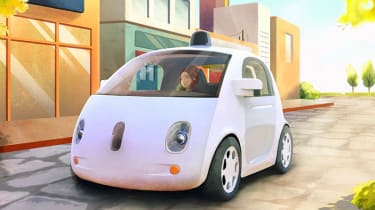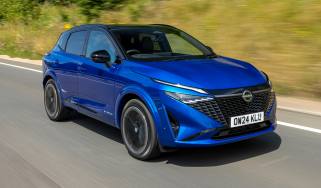US urged to allow sale of Google driverless cars
Self-driving cars should be road legal if they pass standard crash tests, says Google

The Google self-driving car is already testing out on the streets of California and Texas, and now the internet technology giant is pushing the US government to relax rules on the sale of driverless vehicles.
Current regulations make it illegal to sell cars in the US without a steering wheel or pedals. Many other rules are in place too – often drafted decades ago – that simply don’t recognise the new technologies behind the autonomous car.
With more than 1 million miles of testing under its belt, the leader of Google’s self-drive car project Chris Urmson has just sent a letter to the US government proposing driverless cars should be declared road legal as long as they pass standard vehicle crash tests. The US government has itself called for ideas to speed up the adoption of new self-driving technology, and if a plan is adopted manufacturers around the world will be in a race to put driverless cars in showrooms. Many are likely to license the technology that Google is currently developing on its own prototype Google car.

Not content with dominating the web, Google has its sights set on revolutionising the automotive industry and its first fully operational self-driving cars are already racking up test miles on public roads in the US.
Back in May 2014, the company unveiled the first prototype of its vision of a self-driving car, and since then, Google has worked hard at turning its ideas into reality.
The Google car is the result of many years of research. Although the technology it uses is similar to systems already seen on autonomous Mercedes and Volvo models, Google is approaching the challenge from a very different angle. The vehicle can be summoned to wherever you are by tapping on your smartphone. Google says this opens the possibility of a transport network where you have access to a vehicle rather than owning one.
• Everything you need to know about self-driving cars
“Cars aren’t used 96 per cent of the time,” said Google co-founder Sergey Brin. “In peak time, 30 per cent of city driving is people looking for parking. That goes away if you have cars that drive themselves and drop you off and go find another passenger.”

Google seeks link-up with car brands
Beyond that, Google’s already talking with several car makers, and imagines itself working with manufacturers, fleet providers, suppliers and governments to bring this tech safely into the world.
Google's director of the self-driving division, Chris Urmson, told interviewers at the 2015 Detroit Motor Show the firm has no intention of becoming an 'automaker' meaning if the tech did make it to production, the actual vehicle that utilises it would be built by an established car firm.
Prototypes tested earlier this year were fully electric, limited to 25mph and intended for urban use. A combination of lasers, radar and cameras (17 sensors in total) builds up a full 3D picture of surroundings within a 200m radius, so it can react accordingly. Countering fears about the safety of autonomous cars, Google claims it never gets sleepy or distracted like humans, and has a 360-degree awareness.
A defensive driving style is also built in, so the car never veers into a driver’s blindspot, steers away from vehicles being driven erratically and pauses 1.5 seconds when a red light turns green. Also, if a main system fails, back-ups kick in to bring the car to a safe standstill.
As you can see from the preview video (below), creature comforts have been kept to a minimum – the sparse design will apparently allow Google to learn from the cars and adapt them quickly.
Google is not alone in seeking to improve the motoring experience in this way, Apple has also expressed an interest in self-driving tech, while traditional manufacturers like BMW, Nissan and Volvo are all working on their own systems.
California is one of a number of American states that is allowing car manufacturers test full-autonomous cars.
Volkswagen Group told Auto Express in November it has licences to pilot self-driving Audis in Nevada, Florida and California to clock-up hundreds of miles to test the technology.
• We hitch a lift in a self-driving Audi RS7
Not everyone is convinced, though. A leading auto industry expert warns self-driving cars could be hacked and involved in ‘spam jams’. Wil Rockall, KPMG cyber security team director, said: “Self-drive cars will probably work via Web connectivity and, just as large volumes of electronic traffic can be routed to overwhelm websites, the opportunity for self-drive traffic being routed to create disruption is a very real prospect.”
Google car: who has insurance liability?
A big question mark surrounding autonomous cars such as Google’s is the insurance implication, and exactly who’s responsible if something goes wrong. The Association of British Insurers (ABI) believes that in the early stage of auto driving, it’s likely to follow the same process as aviation.
Scott Pendry, ABI’s policy adviser, motor, said: “It’s likely the driver will be held liable in a crash if they’re able to step in and intervene, overriding the tech by making control inputs.” But as responsibilities shift to the car full-time, this could change. “As vehicles become increasingly connected with others – and as control transfers from human to computer – liability may follow that transfer of risk.”
What do you think about the Google car and self-driving cars generally? Will they be a flash in the pan or the answer to our future transport woes? Join the debate in the comments section below...



